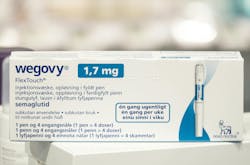FDA Approves Wegovy for Reducing Risk of Cardiovascular Disease for Obese and Overweight Patients
The U.S. Food and Drug Administration (FDA) has approved a new indication for use for Wegovy (semaglutide) injection to reduce the risk of cardiovascular death, heart attack, and stroke in adults with cardiovascular disease who are either obese or overweight.
John Sharretts, M.D., director of the Division of Diabetes, Lipid Disorders, and Obesity in the FDA’s Center for Drug Evaluation and Research, touts Wegovy as “the first weight loss medication to also be approved to help prevent life-threatening cardiovascular events in adults with cardiovascular disease” who are either obese or overweight. “This patient population has a higher risk of cardiovascular death, heart attack, and stroke.”
Approximately 70% of American adults are either obese or overweight. Since people in this patient population have higher risks for serious health problems, Wegovy shows promise in helping these patients.
Researchers studied results from a multi-national, multi-center, placebo-controlled double-blind trial that “randomly assigned over 17,600 participants to receive either Wegovy or placebo.” In addition, participants in both groups received “standard-of-care medical treatment (e.g., management of blood pressure and cholesterol) and healthy lifestyle counseling (including diet and physical activity). Wegovy significantly reduced the risk of major adverse cardiovascular events (cardiovascular death, heart attack, and stroke), which occurred in 6.5% of participants who received Wegovy compared to 8% of participants who received placebo.”
Certain warnings against Wegovy’s use include a “risk of thyroid C-cell tumors,” meaning that patients with medullary thyroid carcinoma or Multiple Endocrine Neoplasia syndrome type 2 should not use the medication. Pancreatitis, gallstones, low blood sugar, acute kidney injury, hypersensitivity reactions, diabetic retinopathy, increased heart rate, and suicidal behavior or thinking are other effects patients and providers should keep an eye out for.
FDA’s website has the news release.

